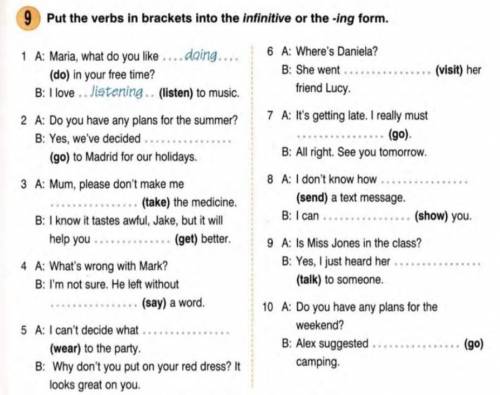9 Put the verbs in brackets into the infinitive or the -ing form. 1 A: Maria, what do you like...daing (do) in your free time? B: I love. Jiaternting.. (listen) to music. 6 A: Where's Daniela? B: She went .. . (visit) her friend Lucy. 7 A: It's getting late. I really must 2 A: Do you have any plans for the summer? B: Yes, we've decided.. . **.. (go). B: All right. See you tomorrow. (go) to Madrid for our holidays. 3 A: Mum, please don't make me 8 A I don't know how (send) a text message. .. (take) the medicine. B: I know it tastes awful, Jake, but it will B: I can... (show) you, help you (get) better, 9 A: Is Miss Jones in the class? 4 A: What's wrong with Mark? B: Yes, I just heard her B: I'm not sure. He left without (talk) to someone. . (say) a word. 10 A: Do you have any plans for the 5 A: I can't decide what . weekend? B: Alex suggested (go) (wear) to the party. camping. B: Why don't you put on your red dress? It looks great on you.

Другие вопросы по теме Английский язык
Популярные вопросы
- 5дес 3 ед 6ед 2 дес 4дм 8см 2дм 6см 6дм 2см или =...
2 - А) из 10м получается 3 одинаковые рубашки. сколько таких рубашек можно сшить...
3 - Демонстрационный итоговый тест по 7 класс №9 сократите дробь 25a^2-20ab+4b^2...
2 - Help! найдите sin альфа, если cos альфа = 3√11/10 и 0п...
2 - Какая саазка андерсана запомнилась вам больше всего и почему...
3 - Подскажите тему для доклада, доклад нужен на . яз....
3 - Вкаком году состоялось открытие московского метрополитена?...
2 - Кулька об ємом 6 см³ має масу 36 г. якою є маса кульки об ємом 2,5 см³,...
3 - Втреугольнике abc ∠b равен 34°,ac=bc.найдите градусную меру внешнего угла...
3 - Почему на чистой коже количество микробов резко сокращается...
1
B: I love listening (listen) to music.
In this sentence, the verb "like" is followed by another verb in the -ing form to talk about a general preference or enjoyment of an activity.
2 A: Do you have any plans for the summer?
B: Yes, we've decided to go (go) to Madrid for our holidays.
Here, the verb "decided" is followed by the full infinitive form of the verb "go" to express a decision or intention.
3 A: Mum, please don't make me take (take) the medicine.
B: I know it tastes awful, Jake, but it will help (get) better.
In this case, the verb "make" is followed by the full infinitive form of the verb "take" to express an obligation or instruction. The verb "will" is followed by the base form of the verb "get" to indicate future action.
4 A: What's wrong with Mark?
B: I'm not sure. He left without saying (talk) a word.
In this sentence, the phrasal verb "left without" is followed by the -ing form of the verb "say" to describe an action that happened without any communication.
5 A: I can't decide what to wear (wear) to the party.
B: Why don't you put on your red dress? It looks great on you.
Here, the phrase "can't decide" is followed by the base form of the verb "wear" to indicate an action that needs to be decided or chosen.
6 A: Where's Daniela?
B: She went to visit (visit) her friend Lucy.
In this sentence, the verb "went" is followed by the preposition "to" and the infinitive form of the verb "visit" to describe an action that someone went to do.
7 A: It's getting late. I really must send (send) a text message.
B: I can show (show) you, help you (get) better.
Here, the verb "must" is followed by the full infinitive form of the verb "send" to express a necessity or obligation. The verb "can" is followed by the base form of the verb "show" to indicate ability or possibility.
8 A: Is Miss Jones in the class?
B: Yes, I just heard her talking (say) to someone.
In this sentence, the verb "heard" is followed by the -ing form of the verb "talk" to describe an action that was heard in progress.
9 A: I don't know how to take (take) the medicine.
B: I can show (show) you, help you (get) better.
In this case, the verb "know" is followed by the full infinitive form of the verb "take" to express lack of knowledge or understanding. The verb "can" is followed by the base form of the verb "show" to indicate ability or possibility.
10 A: Do you have any plans for the weekend?
B: Alex suggested going (go) camping.
Here, the verb "suggested" is followed by the -ing form of the verb "go" to describe a suggestion or recommendation.